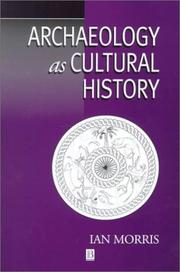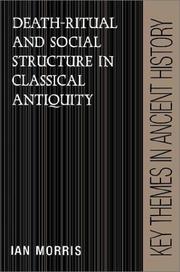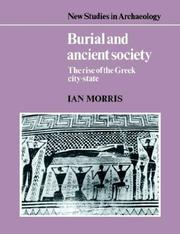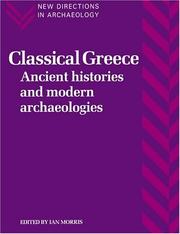| Listing 1 - 10 of 48 | << page >> |
Sort by
|
Book
ISBN: 9780374290023 0374290024 Year: 2010 Publisher: New York Farrar, Straus and Giroux
Abstract | Keywords | Export | Availability | Bookmark
 Loading...
Loading...Choose an application
- Reference Manager
- EndNote
- RefWorks (Direct export to RefWorks)
p.
Civilization, Western --- Civilization, Modern --- Comparative civilization --- East and West --- Civilization, Modern. --- Civilization, Western. --- Comparative civilization. --- East and West. --- World history --- 909.09821 --- Modern civilization --- Modernity --- Civilization --- Renaissance --- Civilization, Oriental --- Occident and Orient --- Orient and Occident --- West and East --- Eastern question --- Civilization, Comparative --- Civilization, Occidental --- Occidental civilization --- Western civilization --- History --- Asian influences --- Oriental influences --- Western influences --- Geschiedenis --- Toekomstbeeldvorming --- Trends --- Toekomstvisie --- Trend --- Geneeskunde --- Techniek (wetenschap) --- Atlas --- Museum
Book
ISBN: 9789000339396 9789000339402 Year: 2014 Publisher: Houten Spectrum
Abstract | Keywords | Export | Availability | Bookmark
 Loading...
Loading...Choose an application
- Reference Manager
- EndNote
- RefWorks (Direct export to RefWorks)
Oorlog heeft z'n voordelen.Als er naar de grote lijn in de geschiedenis wordt gekeken, is de enig mogelijke conclusie dat oorlog het leven op aarde veiliger en vredelievender heeft gemaakt. De cijfers liegen niet. De twintigste eeuw kende twee gruwelijke wereldoorlogen met het hoogste aantal slachtoffers ooit. Maar in deze eeuw stierf het laagste percentage van de mensheid door een geweldsoorzaak.In Verwoesting & vooruitgang komt Morris met onthutsende conclusies over onze toekomst. Hij schrijft met lef en is niet bang om heilige huisjes aan te pakken.Bron : http://www.bol.com
History of civilization --- Polemology --- World history --- Oorlogen --- Geschiedenis --- Politieke geschiedenis --- Oorlog --- Geneeskunde --- Techniek (wetenschap) --- Atlas --- Museum --- Propaganda --- Recht --- Scheepvaart

ISBN: 0631196021 0631174095 9780631196020 9780631174097 Year: 2000 Volume: *7 Publisher: Malden, Mass Oxford Blackwall
Abstract | Keywords | Export | Availability | Bookmark
 Loading...
Loading...Choose an application
- Reference Manager
- EndNote
- RefWorks (Direct export to RefWorks)
Iron age --- Archaeology --- Social aspects --- Greece --- Civilization. --- Antiquities. --- Civilization --- Antiquities --- Iron age - Greece. --- Archaeology - Social aspects - Greece. --- Greece - Civilization. --- Greece - Antiquities.

ISBN: 0521376114 0521374650 0511611722 9780521376112 9780521374651 9780511611728 Year: 1994 Publisher: Cambridge Cambridge University press
Abstract | Keywords | Export | Availability | Bookmark
 Loading...
Loading...Choose an application
- Reference Manager
- EndNote
- RefWorks (Direct export to RefWorks)
In this innovative book Dr Morris seeks to show the many ways in which the excavated remains of burials can and should be a major source of evidence for social historians of the ancient Graeco-Roman world. Burials have a far wider geographical and social range than the surviving literary texts, which were mainly written for a small elite. They provide us with unique insights into how Greeks and Romans constituted and interpreted their own communities. In particular, burials enable the historian to study social change. Ian Morris illustrates the great potential of the material in these respects with examples drawn from societies as diverse in time, space and political context as archaic Rhodes, classical Athens, early imperial Rome and the last days of the western Roman empire.
Civilization, Classical. --- Burial --- -Burial --- -Civilization, Classical --- 393.0938 --- Classical civilization --- Civilization, Ancient --- Classicism --- Burial customs --- Burying-grounds --- Graves --- Interment --- Archaeology --- Public health --- Coffins --- Dead --- Funeral rites and ceremonies --- Grave digging --- Social sciences Death customs Ancient Greece --- Beschaving [Klassieke ] --- Civilization [Classical ] --- Cultuur [Klassieke ] --- Klassieke beschaving --- Klassieke cultuur --- Sépulture --- Sépulture --- Civilization, Classical --- Funérailles --- Civilisation ancienne --- Rites et cérémonies --- Greece --- Rome --- Arts and Humanities --- History --- Burial - Greece. --- Burial - Rome.
Book
ISBN: 9781846682087 9781847652942 1846682088 Year: 2011 Publisher: London Profile
Abstract | Keywords | Export | Availability | Bookmark
 Loading...
Loading...Choose an application
- Reference Manager
- EndNote
- RefWorks (Direct export to RefWorks)
AA / International- internationaal --- 331.100 --- 92 --- Economische geschiedenis: algemeenheden. --- Geschiedenis. --- Civilization, Western. --- Civilization, Modern. --- Comparative civilization. --- East and West. --- Histoire. --- History. --- 92 Geschiedenis. --- 92 Histoire. --- 92 History. --- Economische geschiedenis: algemeenheden --- Geschiedenis

ISBN: 0521387388 9780521387385 Year: 1989 Publisher: Cambridge Cambridge University press
Abstract | Keywords | Export | Availability | Bookmark
 Loading...
Loading...Choose an application
- Reference Manager
- EndNote
- RefWorks (Direct export to RefWorks)

ISBN: 0521456789 0521392799 9780521392792 Year: 1994 Publisher: Cambridge Cambridge University press
Abstract | Keywords | Export | Availability | Bookmark
 Loading...
Loading...Choose an application
- Reference Manager
- EndNote
- RefWorks (Direct export to RefWorks)
Archaeology and history --- Historical archaeology --- History and archaeology --- History --- Greece --- Antiquities. --- Civilization --- Archaeology and history - Greece.

ISBN: 052132680X 0521387388 Year: 1987 Publisher: Cambridge Cambridge University press
Abstract | Keywords | Export | Availability | Bookmark
 Loading...
Loading...Choose an application
- Reference Manager
- EndNote
- RefWorks (Direct export to RefWorks)
City-states --- Funeral rites and ceremonies --- Tombs --- Burial --- History. --- Greece --- Antiquities. --- Funérailles --- Cités-Etats --- Tombes --- Rites et cérémonies --- Grèce --- Antiquités --- Graven. Griekenland (Oud-). --- Steden. Griekenland (Oud-). 7e-4e eeuw vr. Chr. --- Funérailles. Coutumes. Grèce ancienne. --- Tombeaux. Grèce ancienne. --- Villes. Grèce ancienne. 7e-4e s. av. J.-Chr. --- Begrafenis. Gebruiken. Griekenland (Oud-). --- Cities and towns --- Federal government --- Municipal government --- Political science --- State, The
Book
ISBN: 9780374286002 Year: 2014 Publisher: New York (N.Y.) : Farrar, Straus and Giroux,
Abstract | Keywords | Export | Availability | Bookmark
 Loading...
Loading...Choose an application
- Reference Manager
- EndNote
- RefWorks (Direct export to RefWorks)
"A powerful and provocative exploration of how war has changed our society--for the better "War! What is it good for? Absolutely nothing," says the famous song--but archaeology, history, and biology show that war in fact has been good for something. Surprising as it sounds, war has made humanity safer and richer. In War! What Is It Good For? the renowned historian and archaeologist Ian Morris tells the gruesome, gripping story of fifteen thousand years of war, going behind the battles and brutality to reveal what war has really done to and for the world. Stone Age people lived in small, feuding societies and stood a one-in-ten or even one-in-five chance of dying violently. In the twentieth century, by contrast--despite two world wars, Hiroshima, and the Holocaust--fewer than one person in a hundred died violently. The explanation: war, and war alone, has created bigger, more complex societies, ruled by governments that have stamped out internal violence. Strangely enough, killing has made the world safer, and the safety it has produced has allowed people to make the world richer too. War has been history's greatest paradox, but this searching study of fifteen centuries of violence suggests that the next half century is going to be the most dangerous of all time. If we can survive it, the age-old dream of ending war may yet come to pass. But, Morris argues, only if we understand what war has been good for can we know where it will take us next"--
War and civilization. --- War. --- Military history. --- History --- Social science --- Military --- General. --- Anthropology --- Military history --- War --- War and civilization --- Civilization and war --- Civilization --- Armed conflict (War) --- Conflict, Armed (War) --- Fighting --- Hostilities --- Wars --- International relations --- Military art and science --- Peace --- Military historiography --- Historiography --- Naval history
Book
ISBN: 9789027445926 Year: 2011 Publisher: Houten Spectrum
Abstract | Keywords | Export | Availability | Bookmark
 Loading...
Loading...Choose an application
- Reference Manager
- EndNote
- RefWorks (Direct export to RefWorks)
World history --- Azië en het Westen --- geschiedenis. --- politiek. --- filosofie. --- wetenschappen.
| Listing 1 - 10 of 48 | << page >> |
Sort by
|

 Search
Search Feedback
Feedback About UniCat
About UniCat  Help
Help News
News